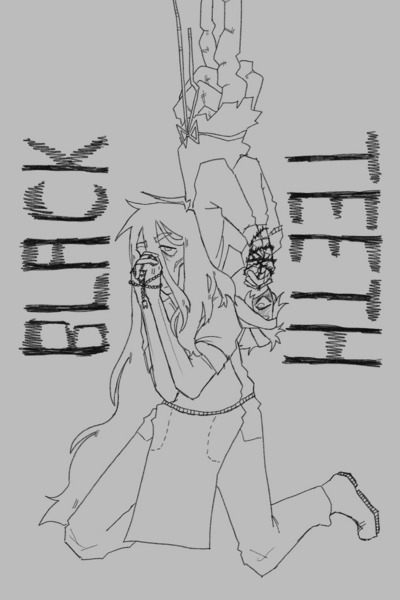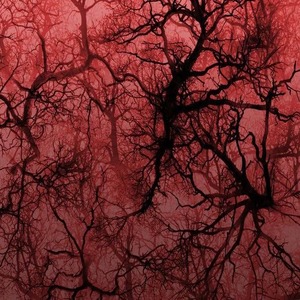This chapter contains the following trigger warnings:
Graphic descriptions of gore (especially of an eye / face)
Exposed bone
Masochism (in thought)
Implied torture or kidnapping
Machiavelli dabbed the man’s forehead with the wet rag. Upon impact, the man’s hands scrunched up into loose fists, but he gave no other complaint. Very light rubbing removed the stains and revealed the actual scratches, which welled up slowly after being cleaned. Machiavelli tried to work fast to keep track of what needed bandaging. The man’s hand would not budge from its guarding position, so the doctor had to clean around the fingers and arm. The scratches–cuts, maybe, for they formed deep canyons in the man’s flesh–traced the skin from the man’s right cheek to the left side of his hairline. A couple marks went further, trailing off on the top of his skull. His left eye was a lost cause. Wounds circled and struck through the socket, where the skin pushed back and sagged with the pulpy remnants of the eye. White chunks stained a brutal pink clung on only with thin muscle fibers. Tears of blood and pus streamed down between the pieces, and the droplets caught the man’s eyelashes, attempting to drag the pulp down with them. Something about their snail-like movement–weaving back and forth, as if deciding the path to take–made Machiavelli shudder and clamp the rag lightly over the wound. The man breathed in sharply. He released his hand from his face to grip Machiavelli’s arm, attempting to dig his nails into the doctor’s skin. When he did so, Machiavelli realized that the man’s nose was almost entirely gone. A blood-crusted pocket of bone filled with the dim light from the overhead fan. Some of the remaining pieces of cartilage and skin fell from the cavity when the man had moved his hand away, coming to rest in his lap.
As Machiavelli stared, petrified, at the man’s face, he had pressed the rag deeper into the eye socket. The flesh pushed against the rag, filling it with blood. It took some patience to unstick the poor piece of fabric from the socket without hurting the man further. Part of Machiavelli wished the man would scream instead of prolonging this painful silence, only interrupted by distorted panting from the torn nose. The man’s nails–though Machiavelli could not see them–barely even grazed the doctor’s skin with their short length. His fingertips made no better progress, only leaving quickly-vanishing marks on Machiavelli’s arm before retreating. The man’s iris was circled by an unnatural amount of white. Most of the bleeding had stopped or slowed down substantially, but the blood had provided a vaguely warm cover for the wounds against the freezing air, whether it be indoors or outdoors. Wiping it away had helped in some ways, sure. But now the air conditioning stung like microscopic pin pricks digging into his flesh. The man felt suddenly raw, a piece of unidentifiable meat, his head a blister that had just barely burst. His breath caught in his throat, cooling his insides. His mind was simultaneously tethered to the intense sensations of pain and far away from the situation he found himself in. The remaining pupil dilated as he hung onto consciousness for nothing more but to embrace how delicate his body felt. He held onto Machiavelli’s shoulders with both arms, shaking.
“Woah, woah, woah…” the doctor said, straightening his posture to support the man, “I got you. Okay? This might sting…”
The man groaned. With gentle touches, Machiavelli began applying antibiotic ointment to the wounds. The ointment burned against every open piece of skin, adding a new element of lightless fire to the overwhelming sensations tingling the man’s mind. What an ironic ecstasy! They were strangers. The man was at death’s door, but each moment pulled him away from the doorbell. Machiavelli spoke–perhaps a murmur of telling him to stay still, perhaps apologizing for the pain–but the man did not hear anything except the pounding of his own heart and the breath flowing out of him. Some amount of ointment made the doctor feel satisfied, stepping back to change out his tools. Gauze bandages rolled over the man’s cheek. Despite the moments of frozen fear, like a deer viewing a corpse, Machiavelli never fully recoiled or threatened to vomit at the sight of the stranger. He worked without another word. The bandages pressed down against the man’s skull with a comforting pressure. Machiavelli pushed aside some of the bloodied strands of hair, almost brushing them with his fingers–the idea might have been more tender under less messy hands and less blood-ridden circumstances. He focused the gauze particularly around the mostly vacant socket. Around and around the gauze went, guided by nimble fingers, unable to be traced by the stranger. Machiavelli finally fixed the gauze in place around the back of the man’s neck. Much of the cover had bloody fingerprints or smears running across the surface, but it appeared to hold back any fresh blood for the time being.
“One moment,” The doctor said, stepping away from the couch.
Machiavelli tossed the bloody rag into the laundry bin, replacing it with a freshly rinsed cloth. Thinking quickly, he grabbed a small cup from the medicine cabinet and poured sink water into it. When he returned, he showed the rag, the cup, and two painkillers to the man.
“I really need to return to my work,” Machiavelli said, “so take these and wipe off your legs and such. Do you understand?”
The man nodded slowly, a simple motion that made his eye feel like a piece of lead rolling in his skull. He took the cup and rag from Machiavelli’s hands, trembling slightly, but stared at the painkillers.
“Oh? This, ah…” Machiavelli fished the bottle out of his pocket and showed it to the man, “It’s over the counter stuff.”
This appeared to appease the stranger, given how he pinched the two pills between his fingers and held onto them tightly. But they stayed in his hand as he curled up on the couch. Machiavelli began turning away from him.
“I’ll be back. Just hang on,” He said before entering his bedroom. The door shut behind him.
Now that he was out of sight and hopefully hearing, Machiavelli exhaled deeply and leaned against the wall. His shoulder ached, and an uncomfortable amount of blood covered his clothes and body. He supposed no amount of blood was comfortable. Regardless, Machiavelli pulled off his gloves, mask, and clothes–some of which stuck to his skin like the rag upon the socket–and wiped off what he could in the master bathroom. He couldn’t take a full shower, that’s for sure. How long had Mr. Limbus been waiting? He barely had any time to check the clock on his way to turn on the radio. Even through his closed door, Machiavelli could hear the lowest tunes of the jazz worm their way upstairs. He sighed again, wiping any redness away with the fervor of a janitor upon a heavy coffee spill. With a quick drying with another washcloth–god, he would have to do so much questionable laundry–Machiavelli pulled on some slacks and a shirt near-identical to those now in the laundry bin. He grabbed another coat and a pair of rags. Maybe he should light a candle to mask the smell. Maybe Mr. Limbus already knew.
The small cup laid on the floor, fully drunk, when Machiavelli passed by the stranger. Perhaps in another life that man had drunk down a shot of rum, and this was him relaxing after a long day. Or perhaps an espresso, pressed dark and steady, resting for a moment before getting back to his feet. Oh, what was his life before? How does a man appear on another’s doorstep, mangled and bleeding, knocking against the curtain between life and death? His face was pressed against the armrest, his legs pulled up near his chest. The blanket under him crackled slightly with his movements. Machiavelli kept his eyes on him, lingering for just a moment. The stairs beckoned to be cleaned.











Comments (0)
See all